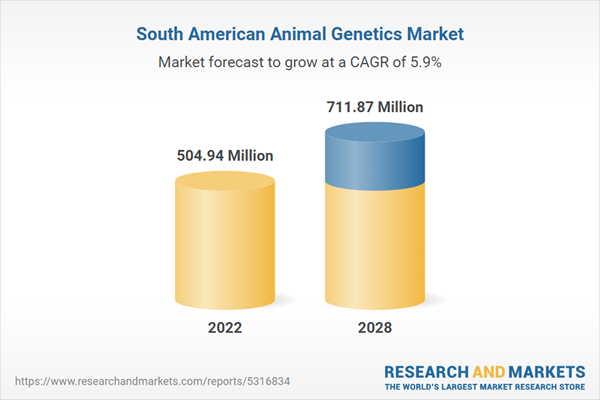Rising Adoption of Progressive Genetic Practices fuel the South America Animal Genetics Market
Animal genetics emphasizes the inheritance and genetic variations in wild and domestic animals. This science is used commercially to test genetic disorders, genetic traits, and DNA type. Further, superior animal breeds are developed using genetic engineering to obtain large-scale production of modified breeds. Animal genetics uses genetic practices such as artificial insemination (AI), embryo transfer, and cytological studies for hybridization. AI can reduce various risks in animal breeding and disease transmission. It is found that female cattle born through AI yields more milk than cattle born via natural breeding. In addition, the use of antibiotic-containing semen extensors is effective in preventing bacterial diseases, making the entire AI process more hygienic than natural mating.The market players focus on partnerships, collaborations, and acquisitions to develop genetically modified breeds in order to strengthen their position in the market. Further, the collaborations by the companies benefit farmers with advanced technologies that allow them to improve the genetics of their herds. The farmers can also benefit from AI advantages such as maintaining breed and cawing records, better record-keeping, and preventing the spread of certain diseases. Thus, the increasing adoption of progressive genetic practices such as AI and embryo transfer benefits the market growth.
South America Animal Genetics Market Overview
The animal genetics market in South America is segmented into Brazil, Argentina, and the Rest of South America. Brazil holds a major market share in this region, and it is further expected to record the highest CAGR in the market during the forecast period. Growing developments associated with animal health preservation, coupled with rising animal breeding activities, propel the animal genetics market growth in South America.South America Animal Genetics Market Revenue and Forecast to 2028 (US$ Million)
South America Animal Genetics Market Segmentation
The South America animal genetics market is segmented based on type, animal, genetic material, and country. Based on type, the South America animal genetics market is bifurcated into services and product. The services segment held a larger market share in 2022.Based on animal, the South America animal genetics market is segmented into porcine, poultry, bovine, canine, and others. The porcine segment held the largest market share in 2022.
Based on genetic material, the South America animal genetics market is bifurcated into embryo and semen. The embryo segment held a larger market share in 2022.
Based on country, the South America animal genetics market is segmented into Brazil, Argentina, and the Rest of South America. Brazil dominated the South America animal genetics market share in 2022.
Neogen Corp, Genus Plc, Topigs Norsvin Nederland B.V, Zoetis Inc, Hendrix Genetics B.V, Alta Genetics Inc, GROUPE GRIMAUD LA CORBIERE, and Charles River Laboratories International Inc are some of the leading companies operating in the South America animal genetics market.
Reasons to Buy
- Save and reduce time carrying out entry-level research by identifying the growth, size, leading players, and segments in the South America animal genetics market.
- Highlights key business priorities in order to assist companies to realign their business strategies
- The key findings and recommendations highlight crucial progressive industry trends in the South America animal genetics market, thereby allowing players across the value chain to develop effective long-term strategies
- Develop/modify business expansion plans by using substantial growth offering developed and emerging markets
- Scrutinize in-depth South America market trends and outlook coupled with the factors driving the South America animal genetics market, as well as those hindering it
- Enhance the decision-making process by understanding the strategies that underpin commercial interest with respect to client products, segmentation, pricing, and distribution
Table of Contents
Companies Mentioned
- Neogen Corp
- Genus Plc
- Topigs Norsvin Nederland B.V
- Zoetis Inc
- Hendrix Genetics B.V
- Inotiv Inc
- Animal Genetics Inc
- Alta Genetics Inc
- GROUPE GRIMAUD LA CORBIERE
- Charles River Laboratories International Inc.
Table Information
| Report Attribute | Details |
|---|---|
| No. of Pages | 121 |
| Published | October 2023 |
| Forecast Period | 2022 - 2028 |
| Estimated Market Value in 2022 | 504.94 Million |
| Forecasted Market Value by 2028 | 711.87 Million |
| Compound Annual Growth Rate | 5.9% |
| No. of Companies Mentioned | 10 |









